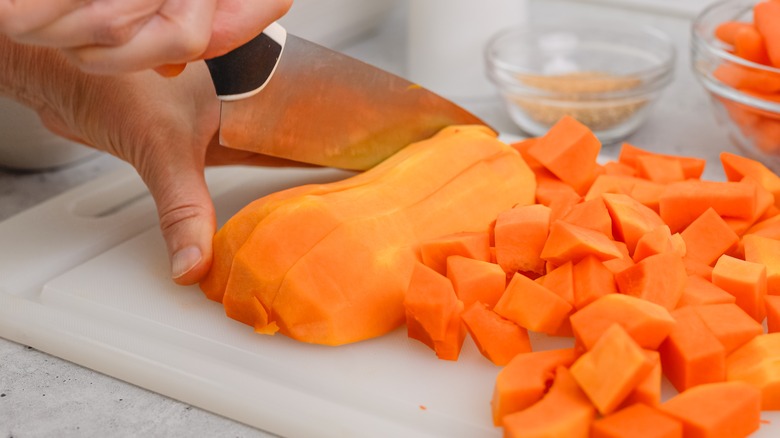How To Properly Freeze Raw Butternut Squash
We may receive a commission on purchases made from links.
When it comes to autumn ingredients, butternut squash is only slightly less well-known than its close cousin, the pumpkin. That said, you're still likely to see butternut squash soup with pumpkin seeds or even roasted butternut squash in fall salads. If you want a fresh, raw butternut squash to last for a while beyond Thanksgiving, you can absolutely freeze it, although there are certain steps to help preserve its freshness for longer while it's frozen.
To properly freeze butternut squash that hasn't been cooked yet, slice your peeled gourd in half, carve out the seeds in the center with a sturdy spoon, and chop the pieces into small cubes or thin slices. From there, you want to briefly lay the cubes or slices out on a baking pan (with parchment paper on it) and store them in the freezer for just an hour, before permanently moving them to an airtight container or Ziploc freezer bags.
Once you've done all this, your raw butternut squash should last about a full year in the freezer, so you'll have until next autumn's harvest to enjoy some homemade butternut squash soup. However, keep in mind that it will begin losing some of its freshness in those final few months.
Why you should freeze your butternut squash in two stages
That intermediate step where you freeze your chopped butternut squash for a short while on a baking pan before storing it in the long term is called "flash freezing." In industrial settings, that term refers to blasting foods with cold temperatures and liquid nitrogen, but at home, it simply means sticking uncovered foods in the freezer briefly. This helps certain foods retain more nutrients while slowing down the rate of decay. The process works by exposing the food to extremely cold temperatures quickly, which prevents ice crystals from forming and stops signs of freezer burn later on. It also works for many other fruits, vegetables, meats, and pastries, and it helps prevent sliced or small foods from freezing together into a messy chunk during its stay in the freezer. Just remember to store your squash in an airtight container afterward, so that it stays protected from air and moisture.
You should avoid storing butternut squash in the fridge for long, because it'll only last about a week at most and the fridge's temperature and moisture won't keep it as fresh. For more short-term storage, a whole and uncut butternut squash can easily last for up to three months when stored in a cool, dark, dry location, like a basement or pantry. The only way to keep the gourd fresh and edible into spring and summer, though, is to slice it up and freeze it.

